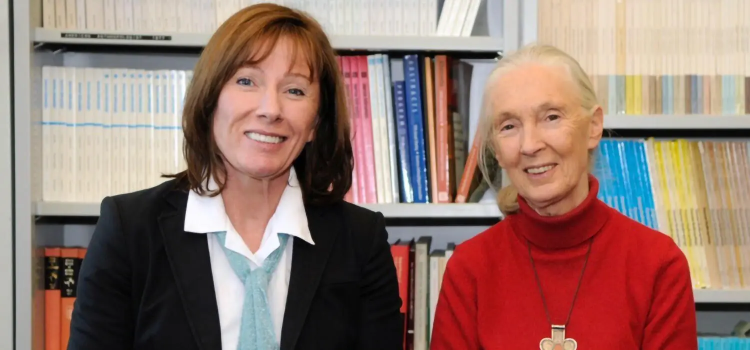Some say never meet your heroes, but Faculty of Arts educators in the primatology program in UCalgary may not agree.
In 2010, renowned scientist Dr. Jane Goodall chose Calgary as one of only two destinations for her public talks, highlighting the programs' strength and reputation.

Jane Goodall, right, and Mary Pavelka pictured during Goodall's UCalgary visit 2010. Photo Courtesy Mary Pavelka
Beyond her visit, Goodall has made a lasting impact on researchers and teachers here. Her extensive career working with primates in the field, and later as an active conservationist and global leader, continues to inspire.
Dr. Mary Pavelka, PhD, is a professor of biological anthropology in the Department of Anthropology and Archaeology, who has been with the program for 37 years, teaching more than 1,200 undergraduate students some of those year, all while balancing an active research career and running field schools worldwide.
Pavelka, who met Goodall when she came to the university for her talk, says she was deeply influenced by the late conservationist's work.
"My own journey started when I took a biological anthropology course and was exposed to human evolution and primatology, which dovetailed with Jane Goodall becoming famous. I could see a woman doing this," she says.
"I remember sitting out in the wild and thinking, I can have this, or a life of the great indoors.' I chose graduate school over law school, much to my family's chagrin."
The result has been the development of one of the best biological anthropology programs in Canada, recognized internationally for its depth, innovation, and impact. There is a commitment on the part of the program to advancing the field, reflected in the recent hiring of leading faculty members, growth of the program's graduate recruitment, and multi-million-dollar research funding.
"The program is wickedly good. It's thriving with research and teaching," says Pavelka.
"Jane had a direct impact on the whole program. She is an unsung hero, and our program is a beautiful example of her legacy."
The university's field schools are important avenues for students to try fieldwork and see if it's a fit for them.
At other universities, students may not try it until later in their education, making it harder for them to pivot.
Pavelka says, "People come out with life-changing experiences, even if it's knowing that it's not for them. Without the field schools providing these opportunities, students might go much farther before realizing it."
Goodall was instrumental in Pavelka's career, and she has worked to ensure she gives the same efforts back to her students.
"Throughout my career, I've loved giving the opportunity back to young students. I have run field schools 23 times, bringing students into the forest to study primate behaviour and integrating research and teaching into true experiential learning," she explains.
Much has changed since Goodall first went into the forests, particularly in how researchers conduct their work on the ground. Goodall herself was untrained, but Pavelka notes that formal training in fieldwork did not begin until the mid-1970s.
"Fieldwork today is not what you might imagine from the early days, and the romanticized image Jane presented to the world," says Pavelka.
"Today, it's heavily structured around research methods and variables. We don't want students to just go out there; we show them what it's like and how to do it well."
Generations of researchers inspired by one woman
Today, Dr. Amanda Melin, PhD, is a professor of biological anthropology, and a Canada Research Chair (CRC) in primate genomics and dietary ecology. But back in 2000, she was a senior undergraduate student in one of Pavelka's field schools in Belize, learning the ways of research.
Like Pavelka, Melin faced two paths when she was accepted to both veterinary and graduate school to pursue field work and chose the field.
"I wanted to go to Costa Rica and follow monkeys around. My family was a bit horrified but supported my decision," Melin recalls.
"I told myself I would keep doing it as long as I could be happy, interested in my work, and able to put food on the table.
"I haven't looked back."
The Melin Lab is focused on a broad range of research in behaviour, sensory ecology and dietary outcomes of nonhuman and human primates, with a principal field site in Costa Rica.
"I am interested in how the senses and diets have evolved, and how animals choose their food," says Melin.
"Right now, we are looking at the aging process and ecological modifiers of the pace of aging and how that impacts diet."
The Santa Rosa Primate Project that Melin co-directs is one of the longest running in Central and South America, helping researchers get a complete picture of the monkeys' lives, to better understand how social and ecological adversity impacts the pace of aging, how different species recuperate after extreme drought or famines, and what the consequences for the species might be.
"It's an inclusive and collaborative community, with research relevant across other departments, from computer science to zoology," says Melin about UCalgary's primatology program.
"When you build critical mass, the students and collaborators come, and then you have others to talk with about your ideas you can do something with that."
Melin attributes the program's reputation to its many high-quality people and a collegial, collaborative environment that has built momentum for both faculty and students.
Her own research has been supported by the work of predecessors in the program, such as Pavelka and Dr. Linda Fedigan, PhD, CM, professor emerita and former CRC.
It was also in Pavelka's field school that Melin saw a woman studying primates, leading a field site and bringing her children along with her.
Seeing that made Melin believe she could do it, too. Today, she brings her own children with her, offering them a glimpse into research and wildlife.
Goodall's legacy lives through scholars like Pavelka and now to Melin, still ringing through the careers of emerging primatologists.
"It's amazing to be contemporary with some of your heroes; I grew up hearing about Jane's studies, and they have been an inspiration to the whole field," she says.
"Many scientific fields are dominated by men, but primatology has been an exception Jane was one of the first women and showed that women can be taken seriously.
"It's hard to imagine all the ways that can be influential to a young woman."













